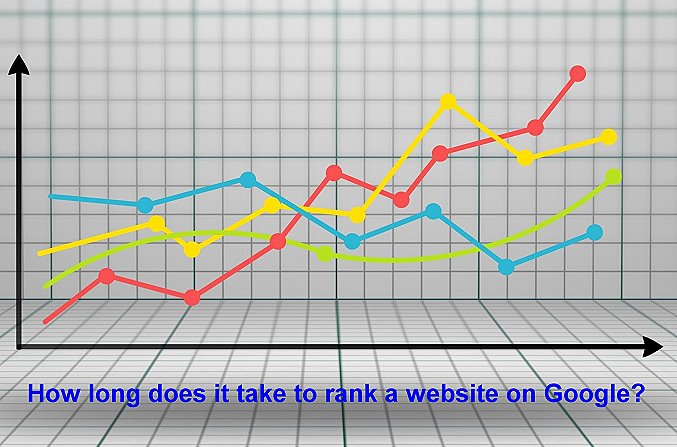by Kurt Scholle

How long does it take to rank on Google?
The short answer is six months to one year. The long answer is: it depends.
15 or 20 years ago, ranking on Google was pretty easy. You just added your main keywords to the title, the URL and page content and viola! – you got to the top 10 in the search results within a few weeks or even days.
You might not achieve ranking nirvana for really competitive keywords, but keywords that could give you decent, targeted traffic.
There was less competition then the search engine algorithms were fairly simple. Most SEOs knew that placing keywords in certain places on the page and getting a few links would do the trick.
Those days are over.
To keep their search results clean, Google and Bing had to deal with keyword stuffing, paid links and other tricks.
That and the fact that there are many more websites and blogs today competing for visitors, makes things more challenging.
How long does it take to rank a new site on Google?
 Today’s post began with a question I answered online.
Today’s post began with a question I answered online.
Ed: “Hi. Would like to ask, I planning to sell Medical equipment products eg hospital bed, n just registered new domain. Planning to design a website n do SEO.
But yesterday, my friend told me, domain less than 2-3 years for medical products, cannot be ranked. Is it truth?”
Me: You may have more problems than the domain age. Depending on how you promote it, and especially in a YMYL niche, you will need to demonstrate being an authority. You also have MANY competitors who have created LOTS of content.
Most blog content takes 7-8 months to reach full ranking. And you will likely need a minimum of 60-70 posts of 1200-3500-5000 words to attract enough traffic.
Ed: “Means we still have a way to get it ranked, correct? But for sure, I don’t have 60-70 posts. I only have a few products.”
Me: You need more content than one article per product. You WILL need dozens of articles pointing to each sales page. Blog posts help pre-frame and warm up cold traffic.
For example, if you are selling or leasing hospital beds, you’d want to write an article about deciding whether to rent or buy and include a comparison chart. Then you’d want to write a comprehensive article on each option. All 3 articles would be optimized for keywords prospects would use for that part of the sales funnel. Usually each query would be based on a question.
Then, I imagine hospital beds are used for different reasons. In each case, they hold a patient. Each model has pros and cons for each need.
For prospects who are a little later in the buying cycle, they might be looking for specific information on each brand or model.
Do you see how you’d need perhaps a dozen articles for each product?
He went on to say that major buyers of hospital beds probably have deals with major vendors, to which I agreed. It’s important to do market research to see if there is even an opportunity, but there are people who buy them for smaller facilities or even home use.
Getting back to his original question about new domain names, there is an advantage to using an aged domain. Any (legitimate) history is better than no history. How far out you register a domain is thought to be a part of Google’s ranking algorithms. Some people register them out 4 to even 10 years!
I think Ed’s is also facing a talent shortage that could doom his plans; a shortage of talent and experience in the multiple aspects of website success. His competitors will have expertise in marketing, building websites, SEO, content creation, ecommerce, etc.
He doesn’t.
You may have the same issues. You can prepare yourself for a more successful new year with my Website Success Essentials course. It’s all new for 2020 and the home-study version of a masterclass I have taught for 6 years.
How long does it take to rank on Google?
I asked the question in some forums to see what people would say.
I said that I know it’s a broad question. I understand it depends on niche, competitors and how many articles you post. I understand that it can take months for each piece of content to peak on the search engines.
Let’s make it more specific…
How much time to rank a NEW website?
Q: Beginning with domain registration, how many days/weeks/months did it take for you to hit 1,000 monthly pageviews? How many articles did it take?
 I’ll go first, I worked with a client on creating a blog to promote their business by attracting people organically and to convince prospects to sign up for a fairly expensive service.
I’ll go first, I worked with a client on creating a blog to promote their business by attracting people organically and to convince prospects to sign up for a fairly expensive service.
We created an editorial calendar around typical FAQs and we optimized it for local, since 80% of the business came from the Chicago area.
We began to see SOME traffic at about 25 published articles – maybe 45-46 total pageviews per day. We about doubled that at 40 posts. So 90 daily page views * 30 days = 2,700 pageviews per month.
A good start, but not enough to live off of.
Things began to take off at 75 articles per month, siloed in strict categories got us about 250 daily page views.
I know people with 75-100 articles that are getting 75k to 100k pageviews a month. You should be able to monetize that very successfully.
One response I got was from someone who was struggling.
“I have a new blog that just hit 6 months. It has 52 articles and 150K words.
It’s JUST starting to get traction on Google now. 1-5 hits a day.
This blog does not have social media or Pinterest attached to it…strictly SEO.”
Another blogger said, “7 – 8 months, to get to 1k. Then it grew quite quickly after that to over 3k.”
Somebody else in the health niche said, “My rankings are down about 40% since the Dec 3 core update.” Good point. Search ranking changes all the time due to algorithm changes or someone creating better content.
Another posted, “I have a new site (6 months next week). I’m getting 20-30 search views a day right now and it’s kind of the off season for the niche. Just published post #48 today. No backlink building yet, virtually no Pinterest. It feels excruciatingly slow, but I know from past experience not to expect much yet. Other domains have seen an instant uptick at 1 year.”
So, there are today’s insights on how long does it take to rank a blog or new website.
How to Rank Immediately
How to rank your new site on Google quickly.
 Step 1: Start with keyword research. Use less competitive versions of a keyword. Instead of “credit cards” consider trying “best credit cards”.
Step 1: Start with keyword research. Use less competitive versions of a keyword. Instead of “credit cards” consider trying “best credit cards”.
Step 2: Optimize pages for your target keywords. Don’t use the same keyword over and over. Try using the ‘SEO Title Tag plugin.
Step 3: Ensure high speed and performance. It’s a critical ranking factor. So is being mobile-friendly.
Step 4: Help Google find and index your website. Use a sitemap. Set up Search Console.
Step 5:Boost your rankings with backlinks. Part of the secret to this is creating content that people want to link to.
What does it take to get ranked on Google?
To get organic traffic to your blog, you need a fair amount of carefully curated content and some online marketing.
But you also need to beat the people who are currently ranking for terms you want to be found for.
Assuming you’re targeting the right keywords. (Read “Best Keyword Research Tools” here)
What is currently ranking? How will you beat it?
For more understanding, let me share some things with you.
- What is a Blog?
- The History of Blogging
- Types of Blog Posts
- How Many Words Does Your Blog Need to Be?
- Blogging Statistics
- More on Blog SILOs
- How to Monetize Your Blog
There are technical considerations too. Google is now ranking sites using a Mobile First algorithm. How fast your website loads is also a significant ranking factor.
Traffic Alternatives to Google
You can get to 1000 monthly page views from other sources and you should have more than one traffic strategy.
Pinterest has been a significant source of traffic for many. Contrary to public opinion, Pinterest is more than sharing recipes. It’s helpful in multiple niches.
Help A Reporter Out (HARO) can build awareness of your brand by being featured in on and offline publications. Plus you often get a link to your site.
You might also consider building a YouTube channel, podcasting or being a podcast guest.

The History of Blogging
Justin Hall is a blogging pioneer. His online journal, Links.net, was created back in 1994 and exists to this day.
It is more of a personal journal than what we think of today as a blog.
It’s pretty sparse. It doesn’t have much of a theme or many images. I doubt that he’s monetizing it.
Definition of Blog
‘Blog’ is short for ‘weblog,’ which is and abbreviation for journaling or “logging on the web.” Years later programmer Peter Merholz was playing around with the word. The sidebar on his blog announces simply, We blog!
I once heard Denise Wakeman say at a conference that BLOG was an acronym for ‘Better Listings On Google.’
Types of Blog Posts That Rank on Google
Backlinko did a survey and found that blog posts in the #1 position on Google average 1,981 words. Other respectable services say 2,500 or more words are needed.
Pillar Posts: 3,500 words take more time. This type of in-depth, comprehensive content tends to do well. Think of guides as an example.
Response Posts: 1,500 words that directly answer one niche question in more detail than a simple Staple Post..
Staple Posts: Typically 800-1,200 words.
You can win writing any of these lengths exclusively, but most people will tell you that a mix of lengths is a best practice. Longer posts obviously take longer to write.
Blog Silos
Famed SEO Bruce Clay has recommended siloing blog content for years. I discuss it in the Guide to SEO. (Search for ‘What are Content Silos.’) Basically, it’s focusing on 5,6 or 8 categories related to your over all site. So, in my case, it might be SEO, Copywriting, WordPress, Paid Ads, Listbuilding and Website Strategy with each article focusing on the category and only linking to other articles in the same category.
I would not also blog about direct mail advertising.
Blogging Statistics
- About a third of all websites are blogs.
- Tumblr hosts the vast majority of blogs with 440 million.
- WordPress, for all its fame and widespread adoption, is a distant second with 60 million.
- More than 2 million posts go live every day, on average.
- Despite this opulence, the people who profit from blogging are few – less than 10% of all bloggers generate some income.
Studies show that only about 1 out of 3 bloggers monetize their sites. Of those, only about 10% of them make more that $1,000 per year.
Ways to Monetize a Blog
There are about 3 primary ways to make money blogging:
- Sell advertising. Ad networks, like MediaVine pay about $10 per thousand visitors. 100k visitors = $1,000.
- Affiliate products.
- Sell your own products or memberships.



